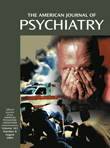The ACTH Response to Dexamethasone in PTSD
Abstract
OBJECTIVE: Enhanced negative feedback and reduced adrenal output are two different models that have been put forth to explain the paradoxical observations of increased release of corticotropin-releasing factor in the face of low cortisol levels in posttraumatic stress disorder (PTSD). To discriminate between these models, the authors measured levels of adrenocorticopic hormone (ACTH) and cortisol at baseline and in response to dexamethasone in medically healthy subjects with and without PTSD. Under conditions of enhanced negative feedback inhibition, ACTH levels would not be altered relative to cortisol levels, but the ACTH response to dexamethasone would be augmented, in concert with the enhanced cortisol response to dexamethasone. In contrast, under conditions of reduced adrenal output, ACTH levels would be expected to be higher at baseline relative to cortisol levels, but the ACTH response to dexamethasone would be unchanged in PTSD relative to healthy comparison subjects. METHOD: The ACTH and cortisol responses to 0.50 mg of dexamethasone were assessed in 19 subjects (15 men and four women) with PTSD and 19 subjects (14 men and five women) without psychiatric disorder. RESULTS: The ACTH-to-cortisol ratio did not differ between groups before or after dexamethasone, but the subjects with PTSD showed greater suppression of ACTH (as well as cortisol) in response to dexamethasone. CONCLUSIONS: The data support the hypothesis of enhanced cortisol negative feedback inhibition of ACTH secretion at the level of the pituitary in PTSD. Pituitary glucocorticoid receptor binding, rather than low adrenal output, is implicated as a likely mechanism for this effect.



